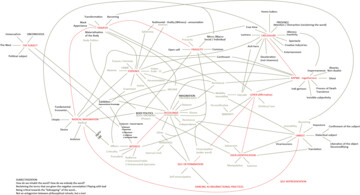For some time now we have been considering questions related to the political potential of a work of art, or, put somewhat differently, about freeing the revolutionary potential of art from its social and political forms of representation and from the limitations of its communicative medium. Jacques Ranciere, for one, talks about the emancipation of art from its representative regime. But what does this actually mean? When we consider the political potential of an artwork, we are usually attentive to the possible changes in the social field that this work can stimulate or evoke. We think about the devices in an artwork (such as the motives, the narratives, or “meaningful spectacle” as Ranciere put it) that contribute towards raising political awareness in a social and economic order. We can even say that it is all about certain political pedagogy. But what we are actually talking about are the ways politics conditions art and not about art’s emancipation from the representational regime.
What we are interested in, then, is something else: the unmediated experiences, acts of creation, operations of desire or even insights, which are not yet formalized knowledge but thoughts in their purest formation, passing the field which has been liberated from the institutionalized rationality. Translations of these operations into the so called representative regime of art are never unproblematic, since they stimulate anxiety, incite new reactions and interruptions of the already-known and if not, they remain hidden until they reach their “extractive conditions”. But how does one recognize the moment of moving beyond the subjective territory of the “not yet” into the plane of transversal linkage? How can radical imagination contribute towards crossing that threshold in question, bridging the gap between subjectivity and the representative regime of art? In order to attempt to answer these questions we should not only reconsider the meaning of imagination and creativity but also the long tradition of conformity to forms of expression and content which resulted in representation coming to dominate our way of thinking.



